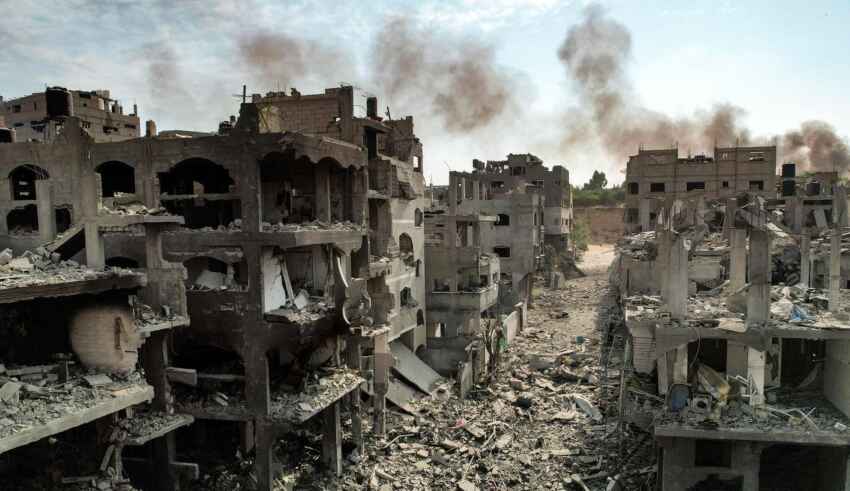
It is no news that the conflict in the Israel-Palestinian region has been receiving a lot of attention over the last decades; however, the recent attacks have been extremely shocking and have allowed us to see how the development of such a deadly conflict can have unimaginable outcomes for the international community.
As this article is being written, after over a month of conflict and a formal military attack plan from Israel that has claimed over 6,000 children’s lives, the country’s military has announced a pause in their advancements in Gaza territory for “humanitarian reasons”. The conflict has undoubtedly had irreversible consequences for the region.
1. The Israeli-Palestinian conflict
Historically speaking, we can see the conflict happening since the end of the 19th century. However, it seems as if it was the UN’s adoption of Resolution 181 in 1947 that culminated in stronger animosity in the region. With this resolution, known as the Partition Plan, the British Mandate of Palestine was divided between the Arabs and the Jews.
The following year, the State of Israel was created, resulting in the first Arab-Israeli war that ended with the victory of Israel, the displacement of 750,000 Palestinians in 1949, and the division of the territory into 3 sections: the State of Israel, the West Bank, and the Gaza Strip. In the following years, tensions kept rising. With Israel’s invasion of the Sinai Peninsula, the neighboring countries of Egypt, Jordan, and Syria signed a defense pact in preparation for a possible mobilization of Israeli troops.
During the 1960’s, after a few maneuvers made by the Egyptian president, Israel attacked Egyptian and Syrian air forces, marking the start of the six-day war, in which Israel came out once again victorious, but now with territorial control of the West Bank and East Jerusalem from Jordan; the Golan Heights from Syria; and the Sinai Peninsula and the Gaza Strip from Egypt.
In the next few years, these countries, who saw themselves losing sovereignty over part of their territory, began to try gaining them back through a series of military and strategic attacks that have not been successful since Israel’s military capabilities are highly advanced and backed by many global superpowers that also have interests in the region, such as the US, whose influence is so significant in the region that to this day it raises significant debates on implied reasons for their support. Israel’s dominance in the region was unbeatable.
Focusing on the West Bank and the Gaza Strip, their dissatisfaction with Israeli presence and authoritarian nature regarding Palestinian lives, customs, and territory has fuelled many movements against the Israeli government, known as the first Intifada. As a result of the first Intifada, mediated by the Oslo I Accords in 1993, it was possible for Palestinians to govern themselves in the West Bank and Gaza, allowing for a mutual recognition of both the authorities of Palestine and Israel. Later on, in 1995, provisions made in the Oslo II Accords would determine a mandate for the withdrawal of Israel from six cities in the West Bank.
This withdrawal procedure wasn’t happening at the pace that Palestinians found appropriate, and combined with other factors such as the visit of Israel’s Prime Minister to a holy site of Islam, it sparked the second intifada by the Palestinians, which lasted 5 years until 2005. Israel’s response was to create a barrier wall separating the West Strip, going against the determinations of the ICJ and ICC.
With the election of 2006, which we will discuss further on, and the conflicts that happened between the newly elected government and the previous longtime majority party, the region found itself in an even worse and more unstable scenario. Despite failed peace talks and the lack of international recognition of the government, even the smallest dispute would result in military attacks between Israel and Palestine, culminating in the announcement by the Palestinian President in 2015 that Palestinians would no longer abide by the territorial division made by the Oslo Accords and that they would fight back for their lost territories.
In the US, with the controversial election of Donald Trump, his explicit support for Israel made the situation worse. In his administration, the protection for Palestinian refugees was revoked, and the agreements that the US helped broker in the region to normalize other countries relationships with Israel gave Israel a strong sense of righteousness, and their pride in being the most relevant state in the region was stronger than ever.
The animosity only grew stronger in the following years, and it ultimately resulted in the attacks of October 7th, 2023, by Hamas against Israel, which we are currently seeing develop in despair for the civilian lives that are in danger and in sorrow for the lives that both militaries have cowardly claimed.
2. Hamas
In 2006, the Palestinian Authority’s parliament elections happened, and the results caused a lot of controversy in the international community. Hamas won the elections, deposing the long-term majority party of Fatah and allowing Hamas to gain political power in Palestine. Their main activities involved recuperating the Palestinian control of the Gaza Strip, which had been under the semi-autonomous Palestinian Authority since 1993.
The international issue that arose from these elections was that the victory of Hamas was not internationally recognized by the United States and the European Union, as Hamas had been considered a terrorist organization by many western governments in the 1990s. Since Hamas gained control of the parliament, a violent conflict between Hamas and the previous party of Fatah erupted.
To contextualize the origin, purposes, and actions of Hamas, we must first start analyzing the formation of the organization. With ties to the Muslim Brotherhood, the group Hamas first identified itself that way in 1988, and by presenting itself as a newer, reformed version of the Brotherhood, it was able to attract followers and supporters. Soon, it became a prominent figure in the region.
On their released charter, they claim that the land of Palestine is an Islamic trust for all Muslim generations and therefore cannot be given away. Therefore, we can conclude that the goal of the Hamas group was to establish an Islamic state instead of Israel in order for the region to be ruled efficiently and according to their beliefs.
Their ideals don’t allow them to see and understand peace and a solution, as the only way for peace to be achieved in the region would be through the claim of their occupied land. This lack of availability for peace talks makes it extremely difficult for the rest of the region to achieve a place where the fundamentalist nature of the organization isn’t imposed.
Hamas, in simpler terms, is a political institution in Palestine, noticeable by their extremist views on their religion as the only viable way of life in Palestine. Their military growth aims not only for their establishment and recognition in the region but also to reclaim occupied territory.
The issue regarding Hamas includes the fact that there are no direct and free democratic elections in the region; therefore, the group’s win in the elections doesn’t necessarily translate to majority support. Data shows that it had anywhere between 35% and 45% of the popular vote, so their election did come with a lot of opposition, both from national Palestinians and the international community.
Regarding their external relations, Hamas have ties with other Islamic groups in Jordan, Egypt, Saudi Arabia, Sudan, and many other movements both in the region and western countries in Europe and some states of the US. Their relationship with Iran also grew significantly in recent years, especially after the golf war, establishing an important alliance between the two, with Iran providing military training to Hamas soldiers.
3. Hamas x Palestine x Israel
This being said, it would be a grave mistake for us to understand the Palestinian cause as the same as Hamas’. The mutual feeling of wanting independence and freedom from Israel’s occupation is being used by Hamas to gain supporters for their terrorist actions; however, religious beliefs are mainly used as a front to “justify” extremist nationalism, which is growing stronger every time a conflict erupts and the world defends Israel over Palestine.
We see this mistake being made by many western countries that understand Hamas as representatives for the entirety of Palestine. So, for example, in recent attacks by Hamas, Israel found themselves retaliating—at first, but as of right now, Israel is unjustifiably attacking the country—against Palestine.
The animosity and hate against Hamas are currently fueling a planned genocide in the region. It cannot be denied that Israel’s military capacity overpowers the rest of the region. Being backed by the US, and especially after Trump’s administration, Israel was able to develop an impeccably strong defense system to protect their civilians and to create and train their military to Western superpower standards to be able to effectively attack their enemies.
With the ever-growing animosity in the region, we cannot describe Israel as at all times the victim in the region. It is understandable how the rest of the region can feel eery regarding Israel’s presence, and as much as this does not justify attacking Israel, the country’s people aren’t at all the ones who are mostly prejudiced in the region. And Israel’s extreme idea of “defense” and even preemptive defense is completely out of hand, throwing their self-defense arguments out the window.
The premise of self-defense is proportionality. Recent attacks committed by Hamas against Israel would unquestionably allow for Israel’s legitimate self-defense. Nowadays, after a month of conflict, Israel is arbitrarily and deliberately attacking Palestine. Self-defense is non-existent. For either side.
Currently, Israel’s position internationally is as if they’re retaliating against the group of Hamas. Theoretically, this would be more legitimate—even though, with the proportions taken, it is not at all—than targeting the Palestinian population; however, what’s effectively happening is exactly that focus on “getting rid” of all Palestinians.
Again, claims of genocide are brought into question. The truth of the matter is that people are dying. In international relations, you cannot claim a life for a life. Much less than 1000 lives for one. The calculated aim of attacking hospitals and refugee camps is unjustifiable, unfair, and a deliberate way of not allowing room for recovery. Israel suffered horrendous attacks, and their defense was to ethnically cleanse Palestine.
4. The US and the ceasefire
In simpler terms, Hamas’ arguments that they are trying to recover occupied territories are just as invalid for attacking Israel as Israel’s arguments of self-defense are for attacking Palestine. With this in mind, communications between the two and the rest of the international community, who have nothing left to do but beg for the conflict to come to an end, are highly unlikely and improbable, as in their mindsets, the only solution for it to end is for it to end permanently, and in an old-fashioned way, by exterminating an entire culture. Israel, with their upper hand, is the most likely to get this done and commit mass extinction against Palestinians.
But how did this come to be? Israel’s military prowess cannot be understood without a prior analysis of the country’s relationship with the US. With the war breaking out in 2023, Biden has announced the US’s full military, diplomatic, and financial support for the Israeli cause. But their alliance has existed for years.
As we said previously, during the former US administration, the support for Israel’s support by Trump, or better said, the disgust for the opposite cause, was so large that their union became a prevalent aid for Israel. The Jewish State saw an important increase in their military capacities and technological advancements, and on top of their own abilities to hold their sovereignty, they could now count on US military support if the conflict develops, like we are seeing happening right now.
The US, trying to be more internationally diplomatic, has also urged Israel to take every precaution needed to not harm civilians after Israel ordered a complete siege of Gaza. Israel has then effectively found a loophole to achieve legitimacy in their attacks: claiming their intelligence shows Hamas presence anywhere in the Strip, which allows them to attack indiscriminately. Palestinian civilian lives aren’t important to protect.
And beyond the US support for the Israeli cause, the country’s major influence in the international community undoubtedly brings in more support from different countries, mainly in the West. With its extreme control over the media, Israel’s case is being made to be much more approachable than Palestine’s.
Media influence is well known to represent not the humanitarian truth but the interests of those who will bring them the majority of the profits. With this in mind, and with the wave of fake news dispersed by the mainstream media, the news is hardly something we can trust. During the conflict in question, we saw many false pieces of information being communicated to us by the media, such as “terrorist” names that were in fact weekdays written in Arabic; false translations of victim speeches to make us believe something different than what they actually went through; and many other false pieces of data, such as the number of babies killed and the murder methods used against Israeli babies.
It almost seems as if the West is trying to get the world, or at least their accessible world, to take on the US cause in support of Israel. But in modern times, US hegemony is being extremely questioned, as, even though they have immense international power, their influence is being increasingly disregarded by scholars and educated civilians that can see through policies and fake speeches.
The US interest in allowing the conflict to continue can even be seen in their foreign decisions, as the US was the only country to vote against a Brazilian-led ceasefire solution for the conflict in October 2023. Being a permanent member of the UNSC, that vote against vetoes the entire decision, and therefore, the conflict continues and the possibility of a ceasefire is denied.
But how come the US doesn’t want a ceasefire? Their argument to go against it was because the text drafted didn’t mention Israel’s right to self-defense. But as we established previously, the conflict has reached such extreme levels that self-defense claims are not applicable to the case, since, as obvious as it is for all states except the US, proportionality wasn’t met in Israel’s response.
The halt of a ceasefire is not only needed, but it also culminates in the protection of the basic human rights of those involved in the conflict. The US denying the ceasefire clearly indicates they are aware of the capacities and possible plans that Israel has to destroy Palestine, but their focus on disregarding Palestinian lives should be shifted to protecting Israeli rights.
This lack of understanding that a ceasefire would also protect Israeli citizens seems to go right over their heads. Maybe because of the fact that, with a ceasefire in place, the arbitrary genocide of Palestinians wouldn’t be able to happen. The goal for both the US and Israel is dominance; however, an idea can never be silenced. In the long haul, animosity will grow again, and another conflict might erupt.
Peace will never come as a result of war. Ceasefire is not a consequence of politics; it is a humanitarian need.
By The European Institute for International Law and International Relations.
REFERENCES
1. Israeli-palestinian conflict | global conflict tracker (no date) Council on Foreign Relations. Available at: https://www.cfr.org/global-conflict-tracker/conflict/israeli-palestinian-conflict
2. Abu-Amr, Z. (1993). Hamas: A Historical and Political Background. Journal of Palestine Studies, 22(4), 5–19. https://doi.org/10.2307/2538077
3. Narea, N. (2023) How the US became Israel’s closest ally, Vox. Available at: https://www.vox.com/world-politics/23916266/us-israel-support-ally-gaza-war-aid













